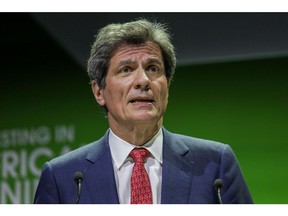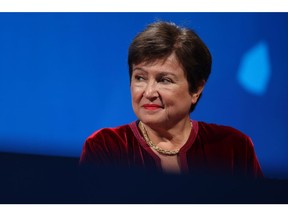(Bloomberg) — The Biden administration is pushing back against Chinese assertions that the US is containing the rise of the world’s second-biggest economy, with a senior diplomat saying more assertive economic measures were necessary to produce “a level playing field.”
Economy
US Says Tough China Moves Needed to Counter ‘National Champions’
|
|

The US has long argued that punitive tariffs, export controls and other measures were necessary to counter China’s “unfair” economic practices, moves that have gathered steam since former President Donald Trump started a trade war with Beijing and sought to thwart the operations of Chinese telecom companies like Huawei Technologies Co.
China in return say the US moves have nothing to do with competition.
“In reality, its so-called competition means to contain and suppress China in all respects,” Foreign Minister Qin Gang said last month, in some of his first major comments since taking on the role after serving as China’s ambassador to Washington. “If the United States does not hit the brake but continues to speed down the wrong path, no amount of guardrails can prevent derailing, and there will surely be conflict and confrontation.”
“I’ll take my chances with our private sector in a level playing field,” Fernandez said. “And you know, we may win some and lose some. But I’ll take my chances. We just have to make sure that we’re all playing by the same rules.”
Fernandez said the US was making a new push on trade because countries told him there was a vacuum and “we needed to make sure that that vacuum was filled or others would fill it for us.” He said the US wanted to create a “new international code of conduct,” both in Asia and in the Western hemisphere.





Economy
IMF Boss Says ‘All Eyes’ on US Amid Risks to Global Economy – BNN Bloomberg


(Bloomberg) — The head of the International Monetary Fund warned the US that the global economy is closely watching interest rates and industrial policies given the potential spillovers from the world’s biggest economy and reserve currency.
“All eyes are on the US,” Kristalina Georgieva said in an interview on Bloomberg’s Surveillance on Thursday.
The two biggest issues, she said, are “what is going to happen with inflation and interest rates” and “how is the US going to navigate this world of more intrusive government policies.”
The sustained strength of the US dollar is “concerning” for other currencies, particularly the lack of clarity on how long that may last.
“That’s what I hear from countries,” said the leader of the fund, which has about 190 members. “How long will the Fed be stuck with higher interest rates?”
Georgieva was speaking on the sidelines of the IMF and World Bank’s spring meetings in Washington, where policymakers have been debating the impacts of Washington and Beijing’s policies and their geopolitical rivalry.
Read More: A Resilient Global Economy Masks Growing Debt and Inequality
Georgieva said the IMF is optimistic that the conditions will be right for the Federal Reserve to start cutting rates this year.
“The Fed is not yet prepared, and rightly so, to cut,” she said. “How fast? I don’t think we should gear up for a rapid decline in interest rates.”
The IMF chief also repeated her concerns about China devoting too much capital and labor toward export-oriented manufacturing, causing other countries, including the US, to retaliate with protectionist policies.
China Overcapacity
“If China builds overcapacity and pushes exports that create reciprocity of action, then we are in a world of more fragmentation not less, and that ultimately is not good for China,” Georgieva said.
“What I want to see China doing is get serious about reforms, get serious about demand and consumption,” she added.
A number of countries have recently criticized China for what they see as excessive state subsidies for manufacturers, particularly in clean energy sectors, that might flood global markets with cheap goods and threaten competing firms.
US Treasury Secretary Janet Yellen hammered at the theme during a recent trip to China, repeatedly calling on Beijing to shift its economic policy toward stimulating domestic demand.
Chinese officials have acknowledged the risk of overcapacity in some areas, but have largely portrayed the criticism as overblown and hypocritical, coming from countries that are also ramping up clean energy subsidies.
(Updates with additional Georgieva comments from eighth paragraph.)
©2024 Bloomberg L.P.
Economy
IMF Boss Says 'All Eyes' on US Amid Risks to Global Economy – Financial Post
The head of the International Monetary Fund warned the US that the global economy is closely watching interest rates and industrial policies given the potential spillovers from the world’s biggest economy and reserve currency.


Article content
(Bloomberg) — The head of the International Monetary Fund warned the US that the global economy is closely watching interest rates and industrial policies given the potential spillovers from the world’s biggest economy and reserve currency.
“All eyes are on the US,” Kristalina Georgieva said in an interview on Bloomberg’s Surveillance on Thursday.
Article content
The two biggest issues, she said, are “what is going to happen with inflation and interest rates” and “how is the US going to navigate this world of more intrusive government policies.”
Advertisement 2
Article content
The sustained strength of the US dollar is “concerning” for other currencies, particularly the lack of clarity on how long that may last.
“That’s what I hear from countries,” said the leader of the fund, which has about 190 members. “How long will the Fed be stuck with higher interest rates?”
Georgieva was speaking on the sidelines of the IMF and World Bank’s spring meetings in Washington, where policymakers have been debating the impacts of Washington and Beijing’s policies and their geopolitical rivalry.
Read More: A Resilient Global Economy Masks Growing Debt and Inequality
Georgieva said the IMF is optimistic that the conditions will be right for the Federal Reserve to start cutting rates this year.
“The Fed is not yet prepared, and rightly so, to cut,” she said. “How fast? I don’t think we should gear up for a rapid decline in interest rates.”
The IMF chief also repeated her concerns about China devoting too much capital and labor toward export-oriented manufacturing, causing other countries, including the US, to retaliate with protectionist policies.
China Overcapacity
Advertisement 3
Article content
“If China builds overcapacity and pushes exports that create reciprocity of action, then we are in a world of more fragmentation not less, and that ultimately is not good for China,” Georgieva said.
“What I want to see China doing is get serious about reforms, get serious about demand and consumption,” she added.
A number of countries have recently criticized China for what they see as excessive state subsidies for manufacturers, particularly in clean energy sectors, that might flood global markets with cheap goods and threaten competing firms.
US Treasury Secretary Janet Yellen hammered at the theme during a recent trip to China, repeatedly calling on Beijing to shift its economic policy toward stimulating domestic demand.
Chinese officials have acknowledged the risk of overcapacity in some areas, but have largely portrayed the criticism as overblown and hypocritical, coming from countries that are also ramping up clean energy subsidies.
(Updates with additional Georgieva comments from eighth paragraph.)
Article content
Economy
Poland has EU's second highest emissions in relation to size of economy – Notes From Poland
[unable to retrieve full-text content]
Poland has EU’s second highest emissions in relation to size of economy Notes From Poland





Source link
-



 Science10 hours ago
Science10 hours agoJeremy Hansen – The Canadian Encyclopedia
-



 Investment10 hours ago
Investment10 hours agoUK Mulls New Curbs on Outbound Investment Over Security Risks – BNN Bloomberg
-



 Tech9 hours ago
Tech9 hours agoSave $700 Off This 4K Projector at Amazon While You Still Can – CNET
-



 Tech8 hours ago
Tech8 hours ago'Kingdom Come: Deliverance II' Revealed In Epic New Trailer And It Looks Incredible – Forbes
-



 Sports8 hours ago
Sports8 hours agoAuston Matthews denied 70th goal as depleted Leafs lose last regular-season game – Toronto Sun
-
Real eState9 hours ago
Sick of Your Blue State? These Real Estate Agents Have Just the Place for You. – The New York Times
-



 Health23 hours ago
Health23 hours agoSupervised consumption sites urgently needed, says study – Sudbury.com
-
News23 hours ago
Canada's 2024 budget announces 'halal mortgages'. Here's what to know – National Post





Comments